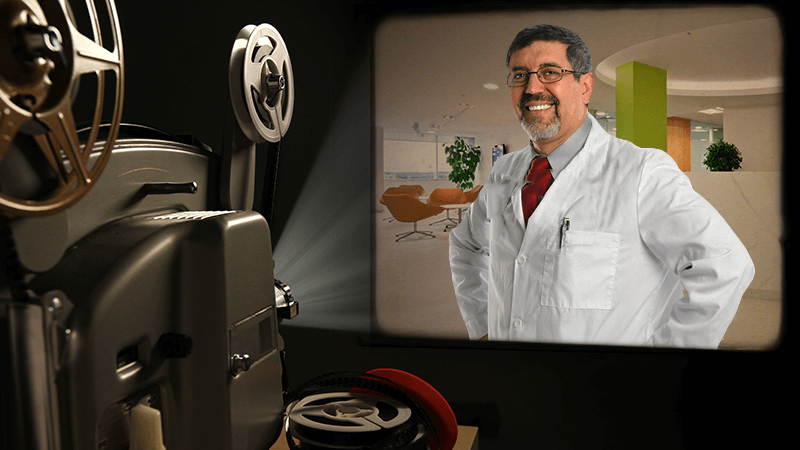
Practice Perfect 689
Lights, Camera, Action…Playing Your Role as a Doctor
Lights, Camera, Action…Playing Your Role as a Doctor

So much of what we do is a performance where we play a role – a job or residency interview, a call to someone to get something we need, and, of course, every single patient encounter we have. We may have the goal of being genuine, but we ultimately act out a role with the object being to convince patients to accept and follow the treatment plan we design for them. In much the same way, our interactions with those around us are performances with a design to get what we want, whether for ourselves or those we choose to help.
As physicians, we often are called upon to act out a role for the benefit of a patient. The better an actor you are, the more likely your patient will follow your advice.
Let’s take a patient encounter I had as an example to clarify. I once had a patient with Charcot arthropathy of the ankle. I caught it in time to cast the leg before the ankle fell apart, creating that terrible deformity that so often ends in limb amputation. Each time I would see the patient (weekly to every other week due to the total contact cast [TCC] – I don’t leave anyone in a TCC for long stretches due to the concern for ulcerations) he would be somber, quiet, and generally depressive.
Now, from my standpoint, this patient was extremely lucky to even have his leg much less have a straight ankle. If we could just be patient long enough to allow his Charcot to coalescence and begin consolidating, he would avoid ulceration, major reconstruction and possible limb loss. He would even have a rectus lower extremity that would allow him to walk without too much difficulty. How much luckier can a person be, given his circumstances? Despite these positives, the patient remained depressed.
Here’s where the acting part comes in. Before going into the patient’s room, I had to mentally prepare myself for the encounter, becoming more positive than normal, more supportive, and more patient. My spin on the entire situation was highly positive with the goal being to convince the patient that things weren’t as bad as he thought. Although I believed everything I said to him, I had to act much more patient than I felt. In reality, I wanted to tell him he was being a baby, should “suck it up” and deal with his adversity like an adult, and realize just how lucky he was, especially considering this entire situation was partially his fault through his uncontrolled diabetes. Obviously, those types of comments, made out of frustration, would not be helpful.
Like an actor taking on a role, I find myself doing this for all of my more difficult patients. I stand by the door for a second, take a deep breath, urge patience to myself and then open the door, smiling. Am I being disingenuous? Perhaps I’m a dishonest person and should just tell everyone exactly what I think and feel.
Some amount of dishonesty must occur between human beings for us to get along with each other. Clearly there’s a balance between honesty and the need to function in society. We all must be dishonest to some extent, and therein lies the challenge. Here are a few suggestions from one dishonest actor to all you other dishonest actors out there.
Empathy will help you maintain patience with your patients
- Always try to be kind - “Brutal” honesty is just that: brutal. It may make you feel better to let it all out, but if your goal is to help others, then brutality won’t do the job.
- Be empathetic and sympathetic - Empathy – putting yourself in another’s place – will help you maintain patience with your patients. Sympathy – having actually experienced the same thing as someone else – is more common than you might think. We’ve all experienced hard times, injury, and pain. Use your own prior experiences the way an actor using the Stanislavski method would to know the “truth” of a character. Use that prior pain to better understand your patient and help them through their personal tribulations.
- Have a goal - If your goal is to convince a patient to accept your recommended treatment plan, then how you portray that plan will matter. Act unconfident, and the patient will not accept the plan. Act confident – maybe better to say BE confident in your plan and represent that confidence – and the patient will follow you down that course.
- Live by the golden rule - It may be trite, but it’s true. Treat everyone – your family, patients, friends, coworkers, trainees, etc – as you would want to be treated. Many times that will mean acting out your roles as a spouse, parent, leader, teacher, and doctor.
We’re all actors playing a part in our own lives and the lives of others. Accepting that role, and the importance of a certain amount of benign dishonesty, will make each of us a little more convincing as healthcare providers. My thanks go out to Dr Alan Sherman for suggesting this interesting topic of discussion. I’ll see you all at the movies!
































Comments
There are 3 comments for this article
This is a must-read article, everyone should read this, especially the medical and aspire medical practitioners. We should pay attention to all their sacrifices and be thankful for they are there to give us medical help. Thanks for this. You can also check this site if you need it in services. acedrycleangc.com" rel="nofollow" target="_blank">http://www.acedrycleangc.com/">acedrycleangc.com
This is a must-read article, everyone should read this, especially the medical and aspire medical practitioners. We should pay attention to all their sacrifices and be thankful for they are there to give us medical help. Thanks for this. You can also check this site if you need it in services. acedrycleangc.com" rel="nofollow" target="_blank">http://www.acedrycleangc.com/">acedrycleangc.com
We believe in serving and giving back to our community. Every year The Doctors Clinic actively supports various health and fitness causes throughout our local Kitsap County communities. The [url=http://www.acedrycleangc.com/]acedrycleangc.com[/url] supports their medical mission in urban poor places.